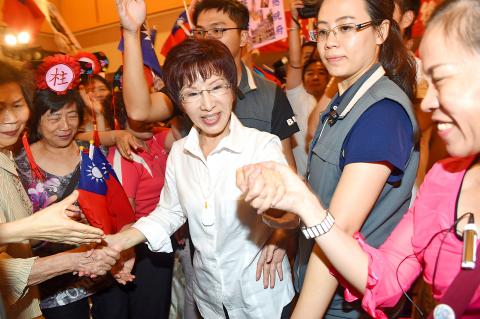Chinese Nationalist Party (KMT) Central Standing Committee member Chiang Shuo-ping (江碩平) yesterday demanded a provisional party congress be held to review whether the party’s presidential candidate, Hung Shiu-chu (洪秀柱), should be replaced, dealing a severe blow to Hung’s campaign and further fueling rumors of division within the party over Hung’s candidacy.
KMT sources were yesterday cited by a TVBS report as saying that the most recent poll conducted by the KMT indicated that Democratic Progressive Party presidential candidate Tsai Ing-wen’s (蔡英文) approval rating had soared to a record level of 45 percent, while Hung’s rating had plummeted to 13 percent.
Anonymous party members said Hung’s support rating was critically low and might severely damage the KMT’s standing in next year’s legislative elections.

Photo: Chien Jung-fong, Taipei Times
Chiang yesterday said he planned to propose that the party hold a provisional party congress at a Central Standing Committee meeting on Wednesday.
KMT sources added that “more than half” of the Central Standing Committee members supported convening a provisional party congress to address the issue of Hung’s candidacy.
In response to media queries on the possibility of party members proposing a withdrawal of Hung’s candidacy, KMT Chairman Eric Chu (朱立倫) earlier yesterday said KMT members are free to “communicate” their opinions via all available channels, adding that party solidarity would be preserved as long as “all come to an agreement.”
In related news, a high-level unnamed KMT source was quoted by the Chinese-language United Daily News as saying yesterday that Hung should not advocate “ultimate unification with China,” because it is not supported by mainstream Taiwanese public opinion.
In a radio interview on Friday Hung said the Republic of China Constitution “calls for ultimate unification with China.”
She said that President Ma Ying-jeou’s (馬英九) stances on the so-called “1992 consensus,” the maintenance of the “status quo,” and “one China, different interpretations,” and “no unification, no independence and no use of force” have “accomplished their medium-term goals,” and that there should now be “political dialogue with China” concerning unification.
Hung had previously advocated the idea of “one China, same interpretation,” only to see her approval rating tank, compelling Hung to “return” to Ma’s standpoints, the source was quoted as saying in the report, who added that Hung “should remember this lesson.”
The “1992 consensus” refers to a supposed tacit understanding between the KMT and Beijing that both sides agree there is “one China,” with each side having its own interpretation of what “China” means.
Hung “is a KMT candidate” who should “ground [her] cross-strait narrative on KMT policies,” or risk the “profound disappointment” of Ma and the party, the source was quoted by the United Daily News as saying.
Hung should “take the initiative” and demand that Tsai, who has said maintaining the “status quo” is the DPP’s policy, clarify how she would define “status quo” and how it would be maintained, the source said.
Additional reporting by Lee Ya-wen

INVESTIGATION: The case is the latest instance of a DPP figure being implicated in an espionage network accused of allegedly leaking information to Chinese intelligence Democratic Progressive Party (DPP) member Ho Jen-chieh (何仁傑) was detained and held incommunicado yesterday on suspicion of spying for China during his tenure as assistant to then-minister of foreign affairs Joseph Wu (吳釗燮). The Taipei District Prosecutors’ Office said Ho was implicated during its investigation into alleged spying activities by former Presidential Office consultant Wu Shang-yu (吳尚雨). Prosecutors said there is reason to believe Ho breached the National Security Act (國家安全法) by leaking classified Ministry of Foreign Affairs information to Chinese intelligence. Following interrogation, prosecutors petitioned the Taipei District Court to detain Ho, citing concerns over potential collusion or tampering of evidence. The

NEGOTIATIONS: Taiwan has good relations with Washington and the outlook for the negotiations looks promising, Minister of Economic Affairs J.W. Kuo said Taiwan’s GDP growth this year is expected to decrease by 0.43 to 1.61 percentage points due to the effects of US tariffs, National Development Council (NDC) Minister Paul Liu (劉鏡清) said at a meeting of the legislature’s Economics Committee in Taipei yesterday, citing a preliminary estimate by a private research institution. Taiwan’s economy would be significantly affected by the 32 percent “reciprocal” tariffs slapped by the US, which took effect yesterday, Liu said, adding that GDP growth could fall below 3 percent and potentially even dip below 2 percent to 1.53 percent this year. The council has commissioned another institution

NEGOTIATIONS: The US response to the countermeasures and plans Taiwan presented has been positive, including boosting procurement and investment, the president said Taiwan is included in the first group for trade negotiations with the US, President William Lai (賴清德) said yesterday, as he seeks to shield Taiwanese exporters from a 32 percent tariff. In Washington, US Trade Representative Jamieson Greer said in an interview on Fox News on Thursday that he would speak to his Taiwanese and Israeli counterparts yesterday about tariffs after holding a long discussion with the Vietnamese earlier. US President Donald Trump on Wednesday postponed punishing levies on multiple trade partners, including Taiwan, for three months after trillions of US dollars were wiped off global markets. He has maintained a 10 percent

TRADE: The premier pledged safeguards on ‘Made in Taiwan’ labeling, anti-dumping measures and stricter export controls to strengthen its position in trade talks Products labeled “made in Taiwan” must be genuinely made in Taiwan, Premier Cho Jung-tai (卓榮泰) said yesterday, vowing to enforce strict safeguards against “origin laundering” and initiate anti-dumping investigations to prevent China dumping its products in Taiwan. Cho made the remarks in a discussion session with representatives from industries in Kaohsiung. In response to the US government’s recent announcement of “reciprocal” tariffs on its trading partners, President William Lai (賴清德) and Cho last week began a series of consultations with industry leaders nationwide to gather feedback and address concerns. Taiwanese and US officials held a videoconference on Friday evening to discuss the